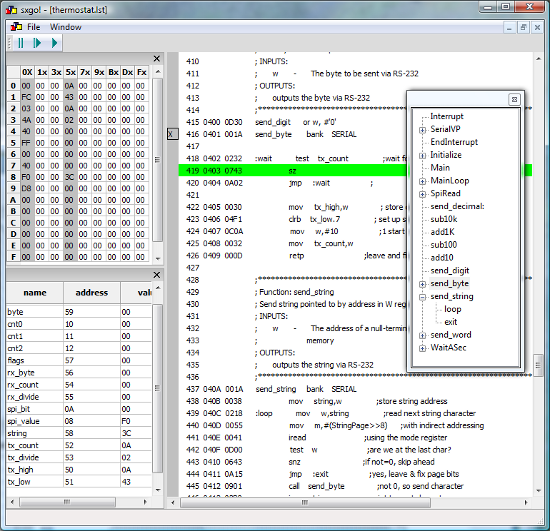Sxgo
From Just in Time
sxgo is my C++-based, soon-to-be open source SX28 emulator.
I'm developing this emulator for my private purposes (mainly testing complex SX assembly projects before doing a burn-and-watch-the-leds-blink-cycle). The emulator is limited in it's functions and certainly not as versatile as the already existing and excellent sxsim for windows. In its simplicity, it's got two advantages though:
- It is portable (I develop on Windows and Ubuntu Linux and have it running on both)
- It is fast. On my 2.66 Ghz machine it runs at about 70 MIPS. Close to real time for most SX projects.
Features
supported
- breakpoints
- single step
- run freely mode (which is interruptable)
- ram window
- watch window
- Outline window, showing clickable code labels
not supported
- anything but the SX28
- the option to map the W register onto address 0
- output panel
- any of the "undocumented instructions"
- and much, much more...
Status
The GUI is quite rough around the edges and it's probably going to be quite easy to break this program. Test coverage has been limited to the listings that I write myself. This means that:
- the simulator could crash
- there may be a bug in some of the sx instruction implementations. Getting the correct Carry-flag behaviour has proven to be interesting, to say the least.
Support
Ah. There's one catch: No guarantees. I could drop this project tomorrow. My dabbling in SXes is pure hobby-work and although I'm a professional programmer, this particular program is just an exercise on the side.
Python module
Sxgo comes with a python module, that allows a programmer to create extensive test-scripts. This feature is one that I'm currently putting much effort into, since complex SX firmwares tend to need some automated testing and python scripts are a very convenient way to do such a thing.
I have made no provisions to install this module into a python environment, since python is one of those areas that I have actually very little experience with. I believe though, that simply copying the module (.pyd file for windows, .so file for linux) to the right location (python scripts directory) should probably do the trick. I myself always use the module in the same directory as the test-scripts and that seems to work too...
Currently, the python module and the emulator GUI are completely separate programs: you can either write a python script to run your SX listings in or watch them in the GUI, not both.
As a teaser, here's a python script that runs a specific SX assembly program (one that reads a SPI temperature sensor and outputs the temperature to a serial port as ascii text). The script breaks the program execution to insert 'simulated' inputs and to retreive the outputs and write them to the PC console output.
# simple test script that runs the thermostat firmware, simulates some input and
# writes the program output to screen.
import sys
import pysix
# load a listing file
listing = pysix.ParseListingFile("../../test/thermostat.lst")
# create an emulator
sx = pysix.Simulator()
# load the listings program bytes into the sx rom
sx.load_rom( listing)
# some code labels
send_byte = 0x0405
after_spi_read = 0x0141
#some data labels
spi_value = 0x08
# the entry point to the send_byte function. At this
# point w will contain a character to be sent to output (LCD/rs-232)
sx.set_breakpoint( send_byte)
# right after a temperature has been read from the spi device
# ram location spi_value will contain the temperature reading.
sx.set_breakpoint( after_spi_read)
while True:
sx.run(10000) # do 10 000 instructions, or stop if we hit a breakpoint
if send_byte == sx.state.pc:
sys.stdout.write( chr(sx.state.w))
elif after_spi_read == sx.state.pc:
# Todo: simplify this. state can only be copied as a whole, not changed
state = sx.state
state.ram.set_absolute( spi_value, 100)
state.ram.set_absolute( spi_value + 1, 0)
sx.state = state
The sources
I do intend to release the sources to this program. It's just that I need things cleaned up a little (mainly adding license information and big fat disclaimers to all the source-files). I intend to release the whole source under the boost license, which is a 'BSD-like' non-viral open source license. See also this explanation.
But I have to warn anybody that is interested in the sources beforehand: If you think that C++ templates are evil, you won't like reading the sources. Even I think that the current implementation of the instruction dispatcher is convoluted and requires unhealthy amounts of caffeine to comprehend, and since I originally intended this program for my personal use only, the source code documentation (comments) are only there to get me started on the project again after a month of real work.
